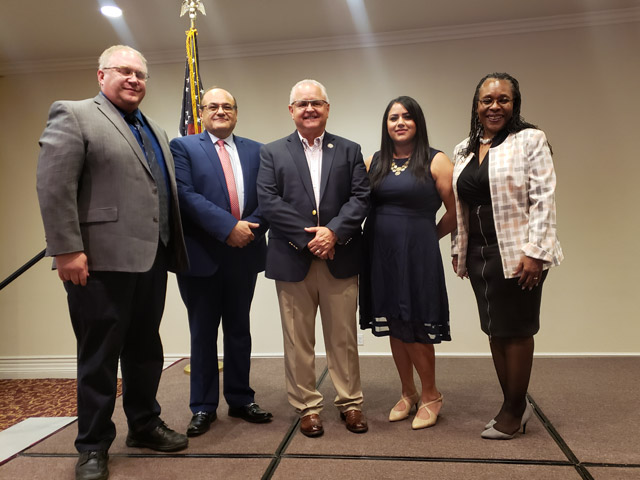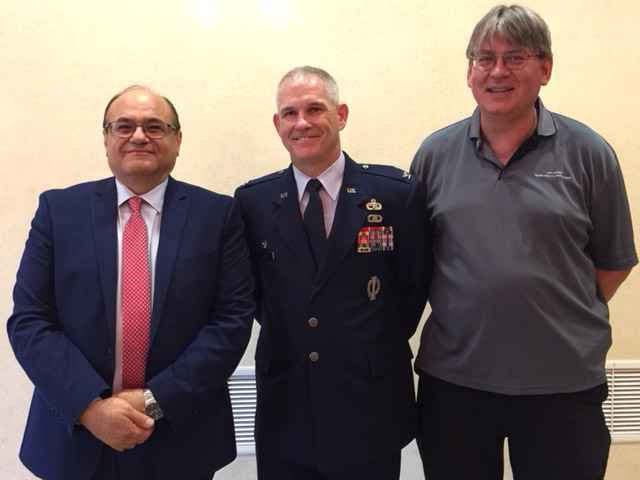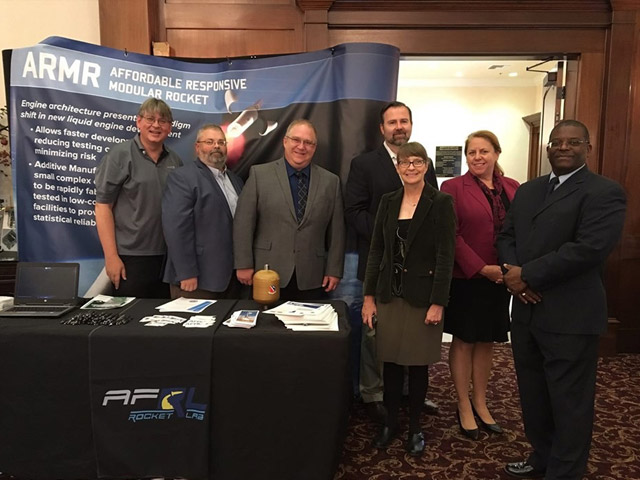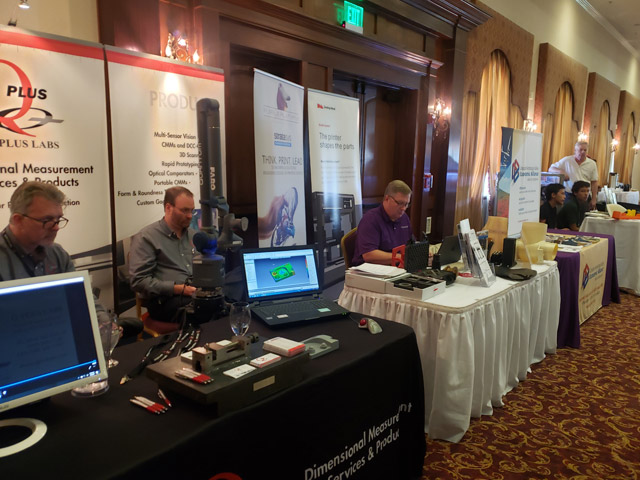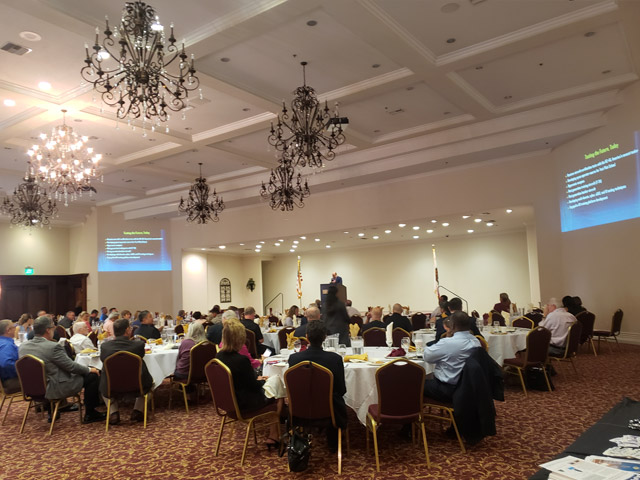California Aerospace Technologies Institute of Excellence (CATIE) collaborates with the US Air Force Research Laboratory (AFRL), other government agencies and laboratories, universities, and industry to promote leading-edge research and technology development in space exploration, aeronautics, and science.
CATIE collaborates with broad, multi-educational institutions in research programs and award-winning outreach.
Antelope Valley College
Math, Sciences, and Engineering
The Math, Sciences, and Engineering division provides students with a broad selection of courses in the sciences and mathematics to serve as a foundation for transfer to four-year universities and increasing one’s own understanding. Disciplines include Mathematics, Physical Sciences, and Life and Natural Sciences. More details about each of the Disciplines can be found at: Agriculture/Park and Landscape Management, Astronomy, Biological Sciences, Chemistry, Earth Science, Engineering, Geosciences, Mathematics, Physical Science & Physics, and Water Treatment. Website link: /academics/ms
Engineering
Engineering applies scientific and mathematical theories to solve practical technical problems. The program boasts a three-pronged approach at this multifaceted industry: a certificate program, an associate degree program and a specialized engineering transfer program. Engineering technology certificate, Associate in Science degree in engineering technology, and there is also a specially designed engineering transfer program for students wishing to transfer to a four-year university in California. More information about the Engineering program can be found: /academics/engineering
The STEM Office at Antelope Valley College was created to foster the study of Science, Technology, Engineering, and Math (STEM). At AVC, STEM incorporates a fusion of ideas and methods from academic fields to prepare our students to further their education goals and develop creative methods of research for our campus community. Located in APL 121A (STEM Office), APL 115 (STEM Lab) and UH 272 (STEM Center of Excellence), the STEM Department has newly renovated spaces where faculty, staff, and students come together to teach, learn, and connect as a community. Website link: /stem
Airframe Manufacturing Technology
AVC’s Airframe Manufacturing Technology program is designed to meet the need in the aerospace industry for multi-skilled individuals who understand, perform, and serve as first-line leads in the major processes of manufacturing the structural components of an aircraft for civilian and military specifications.
California State University Long Beach
Mechanical & Aerospace Engineering
CSULB’s Mechanical & Aerospace Engineering Department programs deliver the solid theoretical foundation and practical basics to prepare you for a successful engineering career, whether you’re interested in robotics and advanced manufacturing or designing the next generation of aircraft or space vehicles.
CSULB offers both undergraduate and graduate degrees in Aerospace Engineering and Mechanical Engineering. Close collaborations with local companies and government agencies deliver internship, scholarship, and employment opportunities and keep the curriculum cutting-edge.
Electrical Engineering
CSULB’s Electrical Engineering programs prepare you to shape future technology, whether in communications, controls, digital signal processing, electronics, or power systems.
Computer Engineering & Computer Science
CSULB’s Electrical Engineering programs prepare you to shape future technology, whether in communications, controls, digital signal processing, electronics, or power systems.
California State Polytechnic University, Pomona
Aerospace Engineering Program
The mission of the Aerospace Engineering Program is to provide an education by hands-on application of theory to produce graduates for a diverse society who can contribute immediately, effectively and ethically to the development of aerospace products and possess the educational foundations for their career growth in industry and academia, with innovation and leadership.
Mechanical Engineering Program
The Mechanical Engineering program provides a quality, well-rounded education that is based on imparting fundamental knowledge and skills in mathematics and pure science as well as engineering science and design.
ME graduates are uniquely suited to jobs in all traditional areas of mechanical engineering including mechanics, machine design, energy systems, fluid flow, heat transfer and thermodynamics. To ensure this, all students take the same fundamental courses, but then choose a series of technical electives geared towards their own interests or career objectives. Additional experience is gained through student design projects and voluntary participation in student clubs, honor societies, and design competitions.
University of Southern California
Aerospace & Mechanical Engineering
Aerospace and mechanical engineers design and build unique, complex mechanical-optical-electronic (mechoptronic) systems, ranging in scale from the International Space Station to microscale electric generators and pumping systems. A broad range of engineering science research is critical to developing novel, complex mechoptronic systems. Consequently, aerospace and mechanical engineers conduct extensive basic and applied research within and crossing their usual disciplinary boundaries, they also synthesize research from many other disciplines. For more information: https://ame.usc.edu/
Astronautical Engineering
Astronautical Engineering encompasses the dynamic and cutting-edge fields of advanced science and space technology. Space engineers design, build and operate rockets and missiles, space launchers, communications and direct broadcasting satellites, space navigational systems, remote sensing and reconnaissance satellites, space vehicles for human spaceflight, and planetary probes. There is no better academic major than Astronautical Engineering in which to obtain the education and to acquire the skills needed for space engineers. For more information: https://astronautics.usc.edu/
Aviation Safety & Security
For over half a century the USC program has served as the gold standard of aviation safety management education, developing a reputation for excellence that is recognized nationally and internationally in the aviation community. Our program was established at USC in 1952 as the first Aviation Safety program at a major research university. We offer 20 courses to nearly 1000 students each year in a personal and hands-on format. Our instructors are skilled educators with extensive industry experience, and courses are taught in small classes to facilitate classroom interaction. Students gain the knowledge to establish safety programs, investigate aircraft accidents, become expert witnesses, and deal with human factor issues. For more information: https://aviationsafety.usc.edu/
Electrical and Computer Engineering
No other discipline is as broad or influences as wide a range of technologies as Electrical and Computer Engineering. More than just circuit and chip design, our researchers lead the way in fields such as Machine Learning, AI, Internet of Things, Brain Imaging, Quantum Technology, and Speech and Language Processing. For more information: https://minghsiehece.usc.edu/
California State University Bakersfield
Computer & Electrical Engineering and Computer Science
As technology becomes an increasingly important part of our everyday lives, the disciplines of computer and electrical engineer and computer science are constantly changing. Our department at CSUB has also expanded and evolved, so we can continue to provide our students with the quality education they need to succeed in today’s challenging high-tech world.
Our degree programs follow the standards set by the professional organizations ACM, IEEE, and ABET. Students in Computer and Electrical Engineering and Computer Science at CSU Bakersfield enjoy unique opportunities to utilize our world-class Robotics Laboratory and AI/Visualization Laboratory as well as other high-tech lab facilities.
Computer Science is the systematic study of algorithms that represent, transform, and transmit information. The field of computer science covers the full range of software and hardware applications that deal with operations on information. CSUB offers a Bachelor of Science (B.S.) degree in Computer Science with three tracks: Computer Science, Computer Information Systems, and Hardware. A Computer Science minor with several areas of specialization is also offered.
Computer and Electrical Engineering involves the design and prototyping of computing devices and systems and encompasses analog and digital circuit design, signals and systems, and other topics in computing where hardware plays an important role. CSUB offers a Bachelor of Science (B.S.) degree in Computer Engineering and a B.S. degree in Electrical Engineering. For more information, visit: https://www.csub.edu/
University of California Riverside
All undergraduate students receive personal attention from staff advisors or faculty mentors throughout their academic careers. Most junior and senior undergraduates participate in cutting-edge research activities in faculty labs, at one of the College’s interdisciplinary research centers, or during internships with industry or agencies. In addition, our students have access to numerous resources through the College of Engineering including academic assistance, study and time management workshops, career guidance, professional development training, membership in professional societies and social activities.
Mechanical Engineering
The ME department is an ABET-accredited program that prepares students for careers in academia, industry or as entrepreneurs. Here you will find information about courses offered, research opportunities, and various resources and tools to help you complete your undergraduate education. The foundation of the specific objectives of the undergraduate Mechanical Engineering program has been guided by the strong belief that the program should provide an equivalent of liberal arts education for the 21st century.
The curriculum is structured so that most of the required courses in mathematics and the basic sciences (physics and chemistry) are completed during the first two years. In addition, two four-unit courses, an Introduction to Mechanical Engineering and Engineering Graphics & Design are offered in the first year. These classes focus on basic engineering concepts and computational engineering tools required for mechanical engineers. Engineering topics are covered primarily in courses offered during the second, third and fourth years. Additional science topics (Biology) are covered in the third year. Students may also take elective courses in specialized topics such as Applied Finite Element Methods, Transport Phenomena in Living Systems, Vibrations, Environmental Impacts of Energy Production, Mechatronics, Combustion and Energy Systems, Optics and Lasers in Engineering, etc., in the senior year. For more information, please visit https://www.me.ucr.edu/academics/undergraduateprogram#curriculum_overview
Electrical Engineering
The Bachelor of Science in Electrical Engineering (EE) program prepares students with an education in three areas - foundational sciences, primary focus areas, and technical electives. Students in the program receive a well-balanced perspective of the world’s challenges and industry’s role in contributing to advancements while gaining experience in their preferred area of technical focus. The Bachelor of Science in Electrical Engineering (EE) Program is accredited by the Engineering Accreditation Commission (EAC) of ABET. We have a continuous improvement process in place within the Department to ensure compliance with ABET requirements. Graduates of UCR’s Bachelor of Science degree program in Electrical Engineering will meet high professional, ethical, and societal goals. For more information, please visit https://www.ee.ucr.edu/academics/undergraduate-program.
California State University Northridge
Electrical and Computer Engineering
The College of Engineering and Computer Science seeks to be a recognized center for excellence for baccalaureate and masters education in computer science and in engineering. The College provides a quality education for its students. It is also a partner in the professional communities of computer science and engineering and provides an essential link between students' education and professional practice. The programs in Electrical Engineering offer students an opportunity to specialize in one of seven areas: Biomedical Engineering, Communication Systems Engineering, Control Systems, Digital System Design, Electronics and Solid State Engineering, Microwave and Antenna Engineering, and Electrical Power Systems.
The programs have state of the art laboratories that enhance learning and hands on experience. The IEEE student chapter plays a key role in providing an extensive network of information and social interaction for our students, ample facilities for project development building and testing with several computer laboratories and full versions of software packages that are used in industry. Students acquire an invaluable education and knowledge in Electrical and Computer Engineering. For more information, visit https://www.csun.edu/engineering-computer-science/electrical-computer-engineering
Mechanical Engineering
There are six areas of focus within the undergraduate Mechanical Engineering program, which are identified through senior elective coursework. These areas are: Aerospace Engineering, Automotive Engineering, Energy Systems & Power, Mechanical System Design, Mechatronics & Robotics, and Thermal-Fluid Systems. Similarly, there are four emphasis areas in the graduate program consisting of: Aerospace Engineering, Mechanical System Design, System Dynamics & Controls, and Thermal-Fluid Systems.
There are over 20,000 square feet of laboratory space dedicated to teaching and research activities, including several state of the art facilities. A portion of the laboratory space is dedicated to our senior design projects which are modeled on the industry workgroups that graduates will encounter on the job. Like professional engineers, our students design and develop a project, from conception through manufacture. In the process they gain valuable experience in working as a team, overcoming technical and management challenges, and developing communication skills. For more information, visit https://www.csun.edu/engineering-computer-science/mechanical-engineering
University of California San Diego
Electrical and Computer Engineering
The Electrical and Computer Engineering (ECE) Department at the Jacobs School of Engineering traces its history back to 1965, with the creation of the department of Applied Electro-physics, which became Applied Physics & Information Science, then Electrical Engineering and Computer Science, and finally ECE as we know it today. Throughout those formative years, our vision focused on information and communication theory and systems, radio physics, and quantum electronics. ECE is among the leading departments of its kind in the nation, built on fundamentals of applied mathematics and engineering physics, providing multidisciplinary, systems-oriented education and research in eleven core areas: Applied Ocean Sciences , Computer Engineering , Communication Theory & Systems , Electronic Circuits & Systems, Electronic Devices & Materials, Intelligent Systems, Robotics & Control, Medical Devices & Systems, Nanoscale Devices & Systems, Photonics, Radio and Space Science, and Signal & Image Processing. For more information: http://www.ece.ucsd.edu/undergraduate/undergraduate-admissions
Aerospace Engineering
Aerospace engineering is a four-year curriculum that begins with fundamental engineering courses in mechanics, thermodynamics, materials, solid mechanics, fluid mechanics, and heat transfer. Additional courses are required in aerospace structures, aerodynamics, flight mechanics, propulsion, controls, and aerospace design. Graduates of this program normally enter the aerospace industry to develop aircraft and spacecraft, but also find employment in other areas that use similar technologies, such as mechanical and energy-related fields. Examples include automobile, naval, and sporting equipment manufacturing. The B.S. degree in Aerospace Engineering is accredited by the Engineering Accreditation Commission of ABET. For more information: http://maeweb.ucsd.edu/undergrad/programs/aerospace
Mechanical Engineering
The Mechanical Engineering Program has a traditional four-year curriculum involving mechanics, vibrations, thermodynamics, fluid flow, heat transfer, materials, control theory and mechanical design. Graduates of this program find employment in the high-technology elector-mechanical industry as well as in the mechanical and aerospace industry. The B.S. degree in Mechanical Engineering is accredited by the Engineering Accreditation Commission of ABET. For more information: http://maeweb.ucsd.edu/undergrad/programs/mechanical

